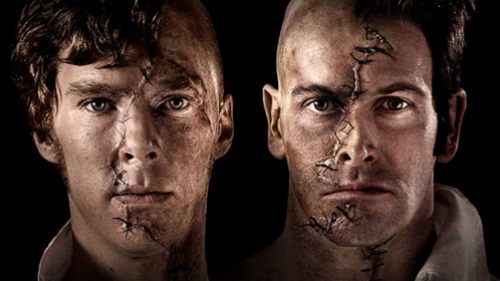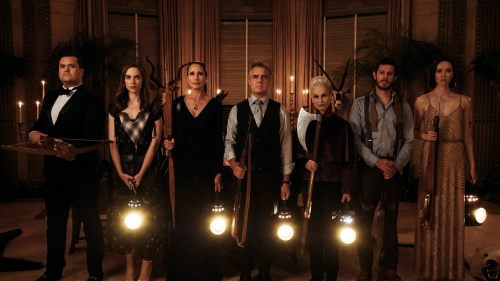12 YEARS A SLAVE Movie Review: A Shattering Horror Film
Leave it to a Brit to make the greatest movie about American slavery.
12 Years A Slave is an extraordinary work, filled with transcendent performances and beautiful cinematography and yet as harrowing as the most disturbing horror movie. The film is unrelenting in its depiction of the dehumanization of people - both black and white - involved in slavery. And yet, in the middle of all that horror, there is a flicker of hope, a small flame of faith in humanity that leads to a small ending that is hugely cathartic.
In many ways 12 Years A Slave is the perfect slavery film for white people; while most slavery stories feature Africans swept away from home into an unknowable new world or people born into a crushing continuum of slavery, this true story is far more Kafkaesque. A free black man from New York is tricked into heading to the South, where he is drugged and sold into slavery. Without papers proving him free he is nothing more than livestock, instantly stripped of his personhood and even his identity, Solomon Northrup is thrust into a world that is completely mad. An educated man who has lived a comfortable life, Northrup - now known as Platt - finds that every rational reaction he has is met with cruelty and violence. He quickly learns that the only way to survive is to leave himself behind, to participate in his own dehumanization by hiding his intelligence, his literacy, his sense of justice. That, more than the vicious beatings he endures, is the horror at the center of 12 Years A Slave.
There are lots of vicious beatings, to be sure. Steve McQueen is obsessed with the degradation of the human body and soul, and how those two things go hand in hand. Just as in Hunger and Shame his camera has an unflinching gaze on moments of pain and suffering and humiliation, and some of those sequences can be hard to watch. There’s a horrific whipping sequence towards the end of the film shot in one, long, fluid, ever-moving shot that sickens you with its violence but more profoundly impacts you with the emotional suffering at the center of it all. Just as the camera never stops circling, so does the transference of hate and culpability continue in the moment.
In Hunger a man destroyed his body to save his soul, while in Shame a man destroyed his soul to pleasure his body. In 12 Years A Slave Chiwetel Ejiofor plays a man who is giving up his soul simply to save his body. Ejiofor shows us Solomon chipped away, piece by piece, giving up bits of himself just so that he can stay alive. And for what? Every thing he gives up reduces him, and by the end he holds a whip in his hand and savages another slave for his master. There’s a scene where slaves gather around the grave of one of their own and sing a beautiful spiritual; Solomon, who plays the violin in New York for dancing white crowds, is at first silent but eventually he begins to join in. This moment - he lifts his voice in song to mourn - could be gorgeous but in McQueen’s hands it is tragic, the final moment when a man becomes a slave, through and through. And so the negro spirituals and work songs that middle class white people love to hear - they have so much soul! - get recontextualized as the moans of agony they truly were.
McQueen’s usual leading man, Michael Fassbender, is also on hand and brilliant, but it’s Ejiofor who gives the film’s great performance. Ejiofor has such a likable face, with such big, expressive eyes, that you can’t help fall for him immediately. Those big eyes in the beginning of the film hold life and hope and fun, but by the end they’re coated in a sheen of sadness and exhaustion; McQueen’s casting coup was to take a man who is as naturally open and friendly as Ejiofor and, over the course of two hours, drain everything away from him.
Ejiofor has the opportunity to work against major talent, especially Fassbender. One of the many masters who subjugate Solomon, Fassbender’s Epps is a landmark movie villain. Cruel, petty, mean, he’s also complex and tortured. His soul is poisoned by the cancer of slavery and the sheer evil of the practice has left him morally adrift. He is obsessed with one slave, perhaps in love with her, but the grotesque inequality of their situation destroys any goodness that could be there. He rapes her, and his wife knows, and his wife hates her for it. Fassbender seethes, bringing Epps to the edge of cartoonishness before injecting humanity into him. He is thoroughly hateful, but he is also human. A shitty human, but a human nonetheless.
Lupita Nyong’o plays Patsey, the slave who has Epps’ affections, and she is incredible. 12 Years A Slave is her first feature film role, and a debut as strong as this can only mean the introduction of a major new talent. She holds within her small, thin frame the weariness of hundreds of years of subjugation, the hopelessness that is inevitable in a situation like this. How do you deal with the manifest injustice of this life? Patsey’s answer is to try to end the life, because the injustice is inescapable.
That injustice is so huge, so all-encompassing, that it can make bad men look good. Benedict Cumberbatch is William Ford, Solomon’s first owner. A minister, he treats his slaves well, and he gifts Solomon with a fiddle. But for all his kindness he is still a slave owner - he is still treating other human beings like livestock. Solomon himself falls for it, and he must be reminded that even the best man who owns other man is a bad man. That’s the way massive injustice distorts reality - it makes smaller injustices seem like kindnesses.
Hans Zimmer’s score, when it’s not rehashing Inception, plays 12 Years A Slave exactly as the horror movie it is. This is a nightmare film, a movie where nothing makes sense and cruelty is commonplace. That McQueen makes it all so pretty, so bucolic, only makes it more terrifying. In 12 Years A Slave slavery isn’t just a historical evil, it’s as immediate as any other existential fear. Slavery is the face of the way we dehumanize each other, and ourselves. 12 Years A Slave illuminates the true ugliness of America’s most horrible period, but it also illuminates the ways we still make excuses for tolerating and ignoring and dealing with evil. And the cost of that, to our souls and to our lives.



